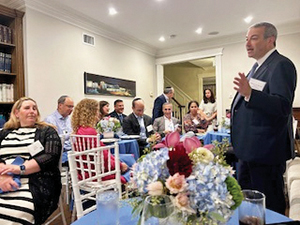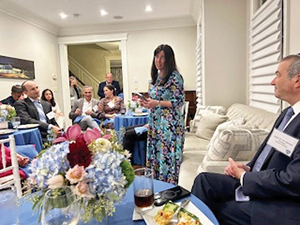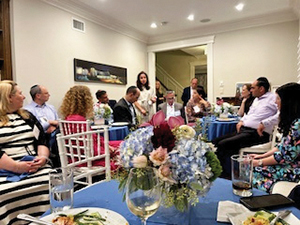
Last week Rabbi Ari and Anita Berman hosted a dinner in their home for a cross-section of Yeshiva University parents and alumni. The goal of the evening was for the guests to meet the new dean of Yeshiva College and Stern College for Women, Dr. Rebecca Cypess. After mingling and eating hors d’oeuvres, filling their plates with dinner from a buffet, the guests sat down at small tables in the Bermans’ living room to listen to Rabbi Berman, president and rosh yeshiva of YU and RIETS, and Cypess.
Cypess came to Yeshiva University from Rutgers University, where she served as the associate dean for academic affairs at the School of Arts. She was also the founding co-chair of J-FAS (Rutgers Jewish Faculty, Administrators and Staff), which combats antisemitism on campus. She has a master’s degree from YU’s Revel Graduate School of Jewish Studies, and a master’s degree from the Royal College of Music in London. She has a PhD from Yale University, and is a music scholar, professor, researcher and performer.
Before introducing Cypess, Rabbi Berman spoke about YU: “Yeshiva University stands for academic excellence and value-based education. This is a world where those two pillars are missed deeply. Our values are in Torat emet—believing and seeking the truth, and acting with compassion. We fly the Israeli flag 365 days a year. I can’t think of a greater distinction from other universities today, where they can’t even say the word ‘Zionist.’ We start every major event singing not just the ‘Star-Spangled Banner,’ but also ‘Hatikvah.’ It’s a place where our students don’t need to be on the defensive, but actually are nourished as the leaders of tomorrow.”
Rabbi Berman then introduced Cypess as the “woman who is going to be leading the next generation of young Jewish leaders on their journey in Torah and Mada,” concluding: “We have in our schools the future artists, architects, computer scientists, healers of mind and body, and we bring them to explore who they are, so that they can nourish their identities and emerge as the best versions of themselves. Through them our whole society is elevated.”

Cypess then spoke. “I was not driven to Yeshiva University by the antisemitism at Rutgers, though the timing could not have been better,” she said. “Assuming a position like this is like a dream come true. It made a lot of the strange pathways and byways that I have taken in my academic career and in my life make sense.
She continued: “Higher education has taken such a dark and cynical turn. Instead of being a place of enlightenment, it’s become a place where professors wield knowledge and put others down to support their own political agendas, even if it’s dishonest. When people talk about what Zionism is on most campuses today, they are lying. They are slandering and making Jews feel ostracized and excluded. The broader picture is that they are degrading themselves and their own institutions.
“But I believe in higher education, and this is where Yeshiva University has the opportunity to stand at the forefront. We are not about using the pursuit of knowledge in order to wield power over others; we are not there to advance a predetermined political agenda. We are there to say: ‘We are here learning about God’s world. We will follow evidence, and the scientific method, traditional scholarly values in our secular classes and traditional Torah values throughout the curriculum to guide us in being ethical people—scholars and students of
goodwill who understand that knowledge is not about putting other people down, but lifting people up—using knowledge as a tool of humanity and goodwill.”
Cypess shared that she was on the faculty of Rutgers for the past 12 years, working her way up from assistant professor to full professor, and then entering administrative roles. By September 2023 she was training to become a full dean. “But after October 7th I was in complete shock and didn’t understand how I could proceed in any academic administrative position. I felt, like many people in universities, that the university had betrayed its own values, certainly had betrayed me, and it was hard for me so see myself being an ambassador for that university, And that’s what an administrator is: an ambassador, an advocate, a cheerleader, advancing the mission of the university. How could I continue pouring my heart and soul into a job that felt vacuous and empty at this point? Then I saw the job posting at Yeshiva University and thought: ‘That makes more sense.’ ”
The new dean has been meeting with each of the professors and is impressed with their passion and dedication. “They pursue academic knowledge through the lens of a Torah life,” Cypress said. “But also the non-Jewish faculty understand the mission of the university, and they are with us. There are levels of excellence we need to trumpet—we need to be more vocal about how amazing our liberal arts and sciences faculties are. In addition, the faculty have ideas and innovative approaches for curriculum—cross-disciplinary programs they are interested in setting up—classes that integrate Jewish studies with professional disciplines.”

She then spoke of two particular events she attended since the students arrived that moved her deeply. At the start of the semester one evening in Yeshiva College, the students gathered in an auditorium to recite Tehillim for the soldiers and captives in Israel. “You could hear a pin drop, “ said Cypess. “The respect and sincerity with which the students approached the task was beautiful. I can’t tell you how different it is from the student population at other universities.” Another event was at Stern College, where a freed hostage, Sapir Cohen, spoke to 400 students. “Again—absolute silence. And when she took questions at the end, each student who spoke first said, ‘Thank you so much for coming; we’re honored that you are here; we love you and support you’—it was an embrace that our students offered to Sapir. Our students have ethics, values and the understanding of right and wrong.”
During the Q&A, Rabbi Berman interjected to express that the roshei yeshiva are very happy with Cypess. She responded: “A couple of the conversations I had with the senior roshei yeshiva have been among the most powerful moments of my professional life, and maybe my whole life. Rav Rosensweig shared a very thoughtful discourse with me on Torah Umada and what it all means, and Rav Meir Twersky cogitates and when he speaks; it’s in a fully formed essay.”
Cypess concluded: “We are the heirs to an incredible intellectual and spiritual legacy. We are the institution where that legacy becomes real. … What does it mean to be mekadesh et hachol? What does it mean to look at the whole world, all of God’s creations and the entire complex, messy human experience through the lens of Torah? That is the legacy of Yeshiva University. If we are not claiming that legacy, nobody will.
“What I would love to see for our community would be to put the brakes on the discourse that says college should be short and superficial. … And actually we are chasing the non-Jewish world in that way. Let’s remind our kids and ourselves that college is a time of growth. Our kids are getting married young and having families young—thank God—but let’s make sure that when they do that, they are going in, having had the opportunity to learn, grow, explore and experience something of what it means to ask questions of the world.”









